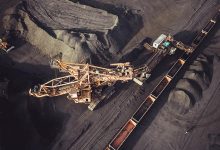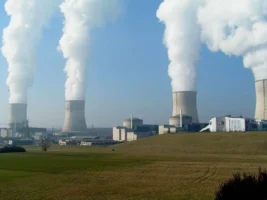German industrial giant Siemens says it will continue to work with Adani’s controversial Carmichael coal mine after the company’s CEO cited arguments from federal resources minister Matt Canavan in an open letter justifying the decision.
Siemens had been awarded a contract by the Adani project to deliver services and equipment to the rail network connecting the coal mine to export terminals on the coast.
Siemens had signed the contract with the Adani project in December but announced that it would review this decision following calls from environmental groups. At the time, the company’s CEO said that he wasn’t aware of the company’s contract with the Adani project.
Siemens had faced growing pressure to walk away from the Adani project, including from environmental campaigners in Australia and in its homeland in Germany. More than 57,000 Germans signed a petition calling on the company to cancel its contract with the Adani mine, with campaigners protesting outside of the company’s headquarters in Munich.
President and CEO of Siemens Joe Kaeser said in an open letter published on Monday that the company considered the Adani contract to be a “very small signaling order for the project”, and confirmed that the company had decided to honour the contract.
Kaeser provided a list of reasons to justify the decision, including that the mine had received approvals from traditional owners, despite ongoing challenges to this claim, and quoted Canavan who wrote in a letter to Siemens that the 2019 federal election had effectively served as a referendum on the Carmichael coal mine.
“The Australian people clearly voted to support Adani at the federal election in May 2019, especially in regional Queensland. It would be an insult to the working people of Australia and the growing needs of India to bow to the pressure of anti-Adani protestors,” Canavan told Siemens in a letter dated 19 December.
Adani’s Carmichael coal mine, which is set to become one of Australia’s largest, has faced several years of strong opposition from environmental groups who have pointed to the impacts the project will have on both local land and wildlife, as well as become a major new source of fossil fuel emissions at a time when stronger action on climate change has been needed.
Swedish climate campaigner Greta Thunberg joined calls for Siemens to refuse to work with the coal mine, tweeting this week that Siemens “have the power to stop, delay or at least interrupt the building of the huge Adani coal mine in Australia.”
It seems that @SiemensDE have the power to stop, delay or at least interrupt the building of the huge Adani coal mine in Australia. On Monday they will announce their decision. Please help pushing them to make the only right decision. #StopAdani
— Greta Thunberg (@GretaThunberg) January 11, 2020
The Siemens CEO said that the company remained committed to being part of the transition to a decarbonised economy, including the company’s aim to become carbon neutral by 2030.
“Siemens, as one of the first companies to have pledged carbon neutrality by 2030, fundamentally shares the goal of making fossil fuels redundant to our economies over time,” Kaeser said.
Kaeser argued that a refusal by Siemens to provide services to Adani would not prevent the project from going ahead, suggesting that competitors would simply fill the gap. Siemens also argued that the need for the company to honour its established contractual arrangements outweighed the climate change considerations of the projects it worked with.
“While I do have a lot of empathy for environmental matters, I do need to balance different interests of different stakeholders, as long as they have lawful legitimation for what they do. This is my responsibility as a CEO and that of the management team. Keeping our promises is Siemens’ highest priority.” Kaeser said.
“We should have been wiser about this project beforehand. Now, we need to be a supplier, who sticks to its commitments as long as the customer stays on legal grounds, too. Because being a company, which is not a reliable source for its customers is simply not an option,” Kaeser added.
The decision by Siemens places the company at odds with other businesses that have sought to distance themselves from the controversial coal mine. All of Australia’s ‘big four’ banks, which includes the NAB, Westpac, ANZ and Commonwealth Banks have declined to provide finance to the Carmichael coal mine following targeted campaigns from customers and shareholders.
Shareholder advocacy group Market Forces said that the decision was “appalling”, saying that the decision undermined Siemens’ own environmental credibility.
“If Adani’s coal mine was a terrible idea in 2019, in 2020 it represents a downright insult to all those who have had their lives turned upside down as bushfires maraud across Australia this summer. The unfolding bushfire crisis in Australia, which has already killed over 20 people and one billion native animals, is just a taste of what is to come if fossil fuel projects like Adani’s go ahead,” Market Forces executive director Julien Vincent said.
“If Siemens’ board thinks this is the end of the conversation, they’re kidding themselves. Siemens will face huge public opposition at its AGM on the 5th of February and will have to explain to its shareholders why becoming part of the most reputationally risky projects in the world is in the company’s best interests.”
Global engineering giant GHD has also ceased its engagement with the Adani project, after the company faced internal pressure from staff to do so, and more than a dozen major insurance companies have also declined to provide financial services to the Adani coal mine.
The decision from Siemens to work with the Adani project has been criticised by environmental groups who had hoped Siemens would join other companies in refusing to work with the Adani mine.
“Siemens’ announcement that it will continue working on Adani’s coal mine while bushfires rage in Australia is nothing short of shameful,” the Australian Conservation Foundation’s Senior Campaigner Christian Slattery said.
“The company has shown its true colours with this decision. It has a climate change policy, but it is hollow and empty.”
“Sadly, Siemens has shown it is no better than the fossil fuel companies it works with.”








